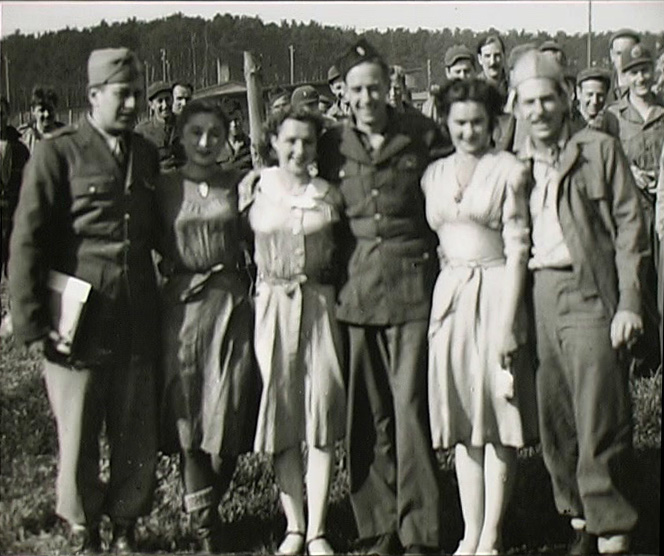MAYDAY MEMORIES
It was May 8, 60 years
ago, that World War II ended in Europe. Can you remember what you were doing
on that day?
We live in interesting times.
All around the world, government emissaries
are scolding each other. Nations are brandishing nightmare weapons. Here at
home we're quarreling about everything; threatening to revise our
constitution, deadlock our Congress, impeach our judges. Out of all this
caustic katzenjammer emerge the words of good old Casey Stengel: "Can't
anybody here play this game!" There was a time when somebody could.
The time was May, 1945. The disastrous World
War II in Europe was over, and 9,000 exuberant ex-prisoners of war waited to
be flown out of Stalag I in Northern Germany. We had been liberated by the
Russians, but we still regarded each other with cool disdain (remember the
Cold War that followed?) Still we tried hard to at least appear friendly,
so when a Russian dance troupe showed up to entertain, we gathered around in
respectful silence.
Turned out, they were pretty good dancers, and
we were really intrigued by their vigorous squatting dance with arms folded
and feet kicking wildly to the beat of stringed music.
Ah, but there was something else! She
couldn't have been much past her teens, and from her front row position, she
soon caught the full attention of the appreciative throng of young males.
The cheers and whistles were not lost on her, and with flushed cheeks and
self-conscious smile, she danced her little heart out. When the number ended
to a thunderous roar of applause, there was no doubt about what the noise
was all about.
Time now to show our appreciation. Our senior
POW officer, Colonel Hubert "Hub" Zemke, stepped forward to distribute
chocolate bars scrounged from our Red Cross parcels to members of the
troupe. When he got to our little dancer, the crowd made no bones about it:
She deserved an extra token. In all innocence, Hub handed her another
d-bar.
That was when all hell broke loose. The troupe
director rushed forward, snatched the bar from the startled chorine, and
unleashed a torrent of Russian rebuke at poor Hub. The crowd stood in
stunned silence: Fighter pilots are not known for their meekness, and here
was one of the most famous ones in England, commander of the aggressive "Zemke's
Wolfpack", and himself an ace several times over. This was going to be
something to watch!
It was. With an apologetic smile, Hub gathered
more chocolate bars, distributed them diplomatically, and soon there were
smiles and handshakes all around.
Hub is gone now, along with so many of those
young airmen from 60 years ago. Too bad. We could sure use a diplomat who
knew how to quell a temper tantrum with a smile and a chocolate bar.
Still you gotta wonder if somewhere in Russia,
a little old white-haired lady sits in her rocking chair and regales the
kids around her about the time she danced for 9,000 young soldiers and
almost kicked off an international incident.
Ken Covington
-
Ken.Covington@Honeywell.com
Ken Covington was in
Stalag I from October 1944 to May 1945. He was in the North Compound for
awhile, but later transferred to South, Barracks 2, Room 11. He was a
bombardier in Warren Kiley's crew, and was shot down over Merseberg on
October 7, 1944.

Photo by Roy
Kilminster - RAF POW at Stalag Luft I
From the book
A Glider
Pilot's Story by Bernard Black:
One of the highlights in the period while we were waiting for the
return to England was a visit to the camp by a Red Army show. This arrived
in a convoy of lorries early in the morning. An open air platform was
erected in the compound and pictorial posters showing aspects of life in the
Soviet Union were displayed on the sides of the huts. For several hours
there followed a continuous performance of singing, dancing, orchestral
music, drama, and oratorical declamation. This non-stop spectacular was
attended by an ever changing audience (no longer captive) of thousands who
cheered enthusiastically at the conclusion of each new offering. At the end
of the day after all their belongings had once more been packed, the
performing company departed in the manner in which they had arrived.
|
